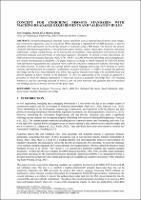Chapter Concept for Enriching NISO-STS Standards with Machine-Readable Requirements and Validation Rules
Author(s)
Ali, Sherief
Zentgraf, Sven
König, Markus
Language
EnglishAbstract
During building project planning, various standards, such as material specifications, value ranges, and construction regulations, must be considered. When analyzing a regulation for its BIM-based use, it must be identified which information can be checked directly or indirectly using a BIM model. The basis for the directly checkable information requirements is the explicit description of object classes, object types, properties, and values. Additionally, complex validation rules can be derived from the standards. These information extractions are mostly performed manually and laboriously on text-based regulatory documents. To provide a better data format, the NISO proposed the Standard Tag Suite (NISO-STS), which is an XML format for publishing and exchanging full-text content and metadata of standards. This paper proposes a concept to enrich standards in NISO-STS format with information requirements and validation rules to provide a machine-interpretable semantic knowledge base for BIM processes. To achieve this, the concept utilizes natural language processing (NLP) methods to extract semantic information from the standards. Furthermore, the paper introduces a workflow to transfer the gathered knowledge into the XML-based standard. This allows the acquired semantic knowledge to be used BIM-based and directly updated in future versions of the standards. To show the applicability of the concept an approach is presented in which the obtained information is stored and used as a queryable knowledge base. The resulting database is used by a querying assistant, in which a user can enter keywords and questions that are translated into SPARQL queries to provide answers for the given input
Keywords
Natural Language Processing (NLP); NISO-STS (Standard Tag Suite); Smart Standards; Rule-based model checking; Semantic knowledgeDOI
10.36253/979-12-215-0289-3.72ISBN
9791221502893, 9791221502893Publisher
Firenze University PressPublisher website
https://www.fupress.com/Publication date and place
Florence, 2023Series
Proceedings e report, 137Classification
Linguistics
Literature: history and criticism


 Download
Download Web Shop
Web Shop